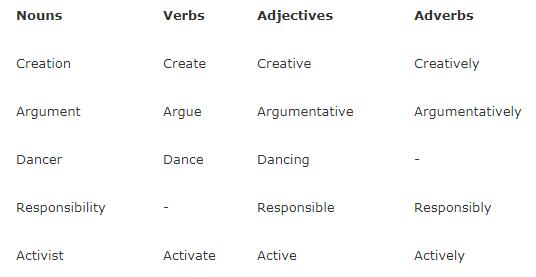Learning New Words: Parts of Speech and Suffixes, Part 2
搜索关注在线英语听力室公众号:tingroom,领取免费英语资料大礼包。
(单词翻译)
Learning New Words: Parts of Speech and Suffixes2, Part 2
playstop
mutemax volume
00:00-06:08
repeat
By Faith Pirlo
06 May 2022
Hello! This week on Ask a Teacher, we will continue to answer Erol's question about learning new words by using suffixes to create adjectives and adverbs.
Question:
Hello,
Ask a Teacher Learning New Words: Parts of Speech and Suffixes Part 2
Ask a Teacher Learning New Words: Parts of Speech and Suffixes Part 2
My name is Erol. What is the best way of learning words? I am very confused about this subject. Can you give me some advice about learning words, please?
Answer:
Last week we looked at creating nouns and verbs by adding suffixes to words. Now, we will create adjectives and adverbs with suffixes.
Reviewing parts of speech and suffixes
Words that add meaning to a sentence are known as content words. Content words often appear as one of the four major parts of speech: nouns, verbs, adjectives and adverbs.
Let us look at an example with all four major parts of speech:
The orange cat cried loudly.
The adjective, "orange" describes the color of the cat which is the noun. Loudly is the adverb that describes the verb "cry" in the past tense.
We add suffixes to the end of the base form of a word to change the part of speech. This way we can create several words from the base form in English.
Making adjectives from nouns
To change some nouns into adjectives we can use several endings: -ful, -less, -y, -al, -ic, and -ical.
For example:
"Beauty" (noun) + suffix1 –ful = "beautiful"
Change the "y" to "i" and add the suffix –ful.
The suffix -ful means having the quality of the noun.
"Emotion" (noun) + suffix -less = "emotionless"
The suffix -less means "without."
"Rain" (noun) + suffix -y = "rainy"
The suffix -y means to be characterized3 by.
"Organization" (noun) + suffix -al = "organizational"
Keep the noun suffix -ation. And add –al, the adjective ending.
This suffix means "relating to."
"History" (noun) + suffix -ic = historic4
Remove the -y and add the suffix -ic.
This word means important or famous in history.
"History (noun) + suffix -ical = historical
Remove the -y and add the suffix.
This word means relating to history or past events.
Let us move on to making adjectives from verbs!
Making adjectives from verbs
To turn some verbs into adjectives, we can use the suffixes -ive, -ious, -ing, -ed/-en and -able.
For example:
"Create" (verb) + suffix -ive = "creative"
Drop the -e and add the suffix.
"Study" (verb) + suffix -ious = "studious"
Drop the -y and add the suffix.
Sometimes participles are used as adjectives. These adjectives can have a sense of either continuation (-ing) or completion (-en or -ed).
For example:
"Cry" (verb) + suffix -ing = "crying"
Keep the -y and add the suffix.
An example sentence is:
The crying baby did not sleep all night.
"Shake" (verb) + suffix -en = "shaken"
An example of this suffix is:
I often drink teas shaken with milk.
Lastly, for making adjectives from verbs, we have the suffix -able. It means able or possible to do.
"Break" (verb) + suffix -able = breakable.
This word means able to be broken.
Finally, many adjectives become adverbs by adding the suffix -ly.
Creative (adjective) + suffix -ly = creatively
Now let us complete the chart from last week that lists possible words you can make by adding suffixes:

图片1
Understanding suffixes can be a path to quickly learning a lot of new content words.
Words in This Story
suffix –n. a letter or group of letters added to the end of a word to change its meaning
confused – adj. to be uncertain or unable to understand something
chart –n. a form of presenting information using a table or columns to group things
 收听单词发音
收听单词发音 




